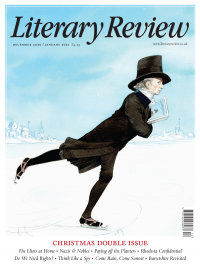Peter Davidson
Mighty Contests & Trivial Things
Alexander Pope in the Making
By Joseph Hone
Oxford University Press 208pp £60
This elegant and adroit investigation of the literary and political coteries in which the young Alexander Pope came to maturity offers a radically different version of the poet’s early life from the one propounded in Maynard Mack’s biographical study thirty-five years ago. In that long-accepted version, Pope, born in 1688, passed his early years in sylvan retirement, enjoying the society of the gentry Catholics of the Thames Valley and perfecting himself as a (mostly pastoral) poet while quietly embarking on a public career as a translator of the classics, such as the Iliad.
The degree to which Joseph Hone’s exhilarating narrative differs from this account may be gauged from the brilliantly counterfactual thought experiment with which it concludes. If we imagine for a moment that the Atterbury Plot in the 1720s had succeeded and James Francis Edward Stuart (also known as the ‘Old Pretender’) had been crowned in London as James III and VIII in place of George I, at that moment would Pope not have looked like a consistently Jacobite poet who had been preparing himself, prudently but efficiently, for this very moment? He had edited and published the overtly Jacobite works of John Sheffield, first Duke of Buckingham, and had possibly, under the cover of collecting literary subscriptions, assisted Atterbury’s fundraising for an invasion. Certainly, the names of a remarkable number of English Jacobites were to be found in the printed subscription lists for his classical translations. His writings had been discussed admiringly at the Stuart court in exile, and he was a friend and associate of leading Jacobite activists, a key member of the cultural circle of the widowed Duchess of Buckingham, and a poet who had circulated coded but loyally Jacobite verse in manuscript.
Hone’s excellent book considers the Jacobite Pope, and then investigates, with wit and energy, the prudent steps Pope took to establish plausible deniability, which enabled him to emerge under the Hanoverians as a poet of classic status – a quiet subject unconcerned with politics, despite his Catholicism, who had spent

Sign Up to our newsletter
Receive free articles, highlights from the archive, news, details of prizes, and much more.@Lit_Review
Follow Literary Review on Twitter
Twitter Feed
Margaret Atwood has become a cultural weathervane, blamed for predicting dystopia and celebrated for resisting it. Yet her ‘memoir of sorts’ reveals a more complicated, playful figure.
@sophieolive introduces us to a young Peggy.
Sophie Oliver - Ms Fixit’s Characteristics
Sophie Oliver: Ms Fixit’s Characteristics - Book of Lives: A Memoir of Sorts by Margaret Atwood
literaryreview.co.uk
For a writer so ubiquitous, George Orwell remains curiously elusive. His voice is lost, his image scarce; all that survives is the prose, and the interpretations built upon it.
@Dorianlynskey wonders what is to be done.
Dorian Lynskey - Doublethink & Doubt
Dorian Lynskey: Doublethink & Doubt - Orwell: 2+2=5 by Raoul Peck (dir); George Orwell: Life and Legacy by Robert Colls
literaryreview.co.uk
The court of Henry VIII is easy to envision thanks to Hans Holbein the Younger’s portraits: the bearded king, Anne of Cleves in red and gold, Thomas Cromwell demure in black.
Peter Marshall paints a picture of the artist himself.
Peter Marshall - Varnish & Virtue
Peter Marshall: Varnish & Virtue - Holbein: Renaissance Master by Elizabeth Goldring
literaryreview.co.uk